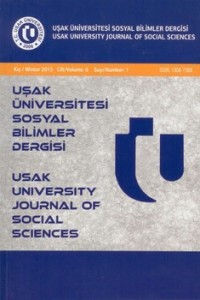The Relationship Between Undergraduates’ View on Internet Censorship, And Their Media Literacy Level
Öz
Media literacy is shown as an alternative to censorship. It is claimed that while censorship curtails young people’s intellectual development, media literacy helps them to grow up as adults who can think critically. The aim of this study is to determine young adults’ (students in higher education) opinions about censorship and examine the relationship between students’ opinions on censorship and their media literacy level. Participants of this study were undergraduate students of an education faculty of middle sized, rural Turkish university. Research results showed that censorship is less supported among the students who spend more time on the internet and who have high media literacy levels. However, students' support for censorship, assuming that other users may be affected negatively, shows that in this kind of studies, it would be more effective to design researches by considering third person effect.
Anahtar Kelimeler
Kaynakça
- Austin, E.W. & Johnson, K.K. (1997) Effects of general and alcohol-specific media literacy training on children’s decision making about alcohol. J Health Communication, 2, 17-42.
- Bevort, E. and Breda, I. (2001) Les jeuneset Internet. Paris: CLEMI, 160p.
- Davison, W. P. (1983). The third-person effect in communication. Public opinion quarterly, 47(1), 1-15.
- Depken, Craig A. (2006). “Who Supports Internet Censorship?” First Monday, 11(9), September 2006.
- Dutton, W. H., Dopatka, A., Hills, M., Law, G., & Nash, V. (2010). Freedom of Connection–Freedom of Expression. Report prepared for UNESCOs Division for Freddom of Expression, Democracy an Peace.
- Etzioni, A. (2004). On protecting children from speech. Chi.-Kent L. Rev., 79, 3.
- Faris, R. and Villeneuve, N. (2008). Measuring Global Internet Filtering.Access Denied: The Practice and Policy of Global Internet Filtering Eds. R. Deibert, J. Palfrey, R. Rohozinski, J. Zittrain. Cambridge, MA: MIT Press.
- Heins, M. (2004). On Protecting Children - From Censorship: A Reply to AmitaiEtzioni, 79 Chi.-Kent. L. Rev. 229 (2004). Available at: http://scholarship.kentlaw.iit.edu/cklawreview/vol79/iss1/8
- Heins, M., and C. Cho. 2003. Media literacy: An alternative to censorship. New York: Free Expression Project
- Karaman, M. K., &Karataş, A. (2009). Media Literacy Levels of the Candidate Teachers. Elementary Education Online, 8(3), 798-808.
- Karasar, N. (2005). Bilimselaraştırmayöntemi. Ankara: Nobel YayınDağıtım.
- Lambe, J. L., &Reineke, J. B. (2009). Public attitudes about government involvement in expressive controversies. Journal of Communication, 59(2), 225-242.
- Ozkan, H., &Arikan, A. (2009). Internet censorship in Turkey: University students' opinions. World Journal on Educational Technology, 1(1), 46-56.
- Pew Research Center. (2014). Emerging and Developing Nations Want Freedom on the Internet. Pew Research Center, Washington, D.C. (March 19, 2014). http://www.pewglobal.org/files/2014/03/Pew-Research-Center-Global-Attitudes-Project-Internet-Censorship-Report-FINAL-March-19-2014-10-AM-ET.pdf, accessed on July 7, 2014.
- Pinkleton, B. E., Austin, E. W., Cohen, M., Chen, Y. C. Y., & Fitzgerald, E. (2008). Effects of a peer-led media literacy curriculum on adolescents' knowledge and attitudes toward sexual behavior and media portrayals of sex. Health Communication, 23(5), 462-472.
- Strauss, A., & Corbin, J. M. (1990). Basics of qualitative research: Grounded theory procedures and techniques. Sage Publications, Inc.
- Tullock, G. (1968). “A note on censorship,” American Political Science Review, volume 62, number 4, pp. 1265–1267. http://dx.doi.org/10.2307/1953918
Öz
Kaynakça
- Austin, E.W. & Johnson, K.K. (1997) Effects of general and alcohol-specific media literacy training on children’s decision making about alcohol. J Health Communication, 2, 17-42.
- Bevort, E. and Breda, I. (2001) Les jeuneset Internet. Paris: CLEMI, 160p.
- Davison, W. P. (1983). The third-person effect in communication. Public opinion quarterly, 47(1), 1-15.
- Depken, Craig A. (2006). “Who Supports Internet Censorship?” First Monday, 11(9), September 2006.
- Dutton, W. H., Dopatka, A., Hills, M., Law, G., & Nash, V. (2010). Freedom of Connection–Freedom of Expression. Report prepared for UNESCOs Division for Freddom of Expression, Democracy an Peace.
- Etzioni, A. (2004). On protecting children from speech. Chi.-Kent L. Rev., 79, 3.
- Faris, R. and Villeneuve, N. (2008). Measuring Global Internet Filtering.Access Denied: The Practice and Policy of Global Internet Filtering Eds. R. Deibert, J. Palfrey, R. Rohozinski, J. Zittrain. Cambridge, MA: MIT Press.
- Heins, M. (2004). On Protecting Children - From Censorship: A Reply to AmitaiEtzioni, 79 Chi.-Kent. L. Rev. 229 (2004). Available at: http://scholarship.kentlaw.iit.edu/cklawreview/vol79/iss1/8
- Heins, M., and C. Cho. 2003. Media literacy: An alternative to censorship. New York: Free Expression Project
- Karaman, M. K., &Karataş, A. (2009). Media Literacy Levels of the Candidate Teachers. Elementary Education Online, 8(3), 798-808.
- Karasar, N. (2005). Bilimselaraştırmayöntemi. Ankara: Nobel YayınDağıtım.
- Lambe, J. L., &Reineke, J. B. (2009). Public attitudes about government involvement in expressive controversies. Journal of Communication, 59(2), 225-242.
- Ozkan, H., &Arikan, A. (2009). Internet censorship in Turkey: University students' opinions. World Journal on Educational Technology, 1(1), 46-56.
- Pew Research Center. (2014). Emerging and Developing Nations Want Freedom on the Internet. Pew Research Center, Washington, D.C. (March 19, 2014). http://www.pewglobal.org/files/2014/03/Pew-Research-Center-Global-Attitudes-Project-Internet-Censorship-Report-FINAL-March-19-2014-10-AM-ET.pdf, accessed on July 7, 2014.
- Pinkleton, B. E., Austin, E. W., Cohen, M., Chen, Y. C. Y., & Fitzgerald, E. (2008). Effects of a peer-led media literacy curriculum on adolescents' knowledge and attitudes toward sexual behavior and media portrayals of sex. Health Communication, 23(5), 462-472.
- Strauss, A., & Corbin, J. M. (1990). Basics of qualitative research: Grounded theory procedures and techniques. Sage Publications, Inc.
- Tullock, G. (1968). “A note on censorship,” American Political Science Review, volume 62, number 4, pp. 1265–1267. http://dx.doi.org/10.2307/1953918
Ayrıntılar
| Birincil Dil | İngilizce |
|---|---|
| Bölüm | Makaleler |
| Yazarlar | |
| Yayımlanma Tarihi | 28 Nisan 2016 |
| Yayımlandığı Sayı | Yıl 2016 Cilt: 9 Sayı: 26/2 |
Adres: Uşak Üniversitesi Sosyal Bilimler Enstitüsü
Telefon: 0276 221 21 60 Faks :0276 221 21 61
E-posta: sosyaldergi@usak.edu.tr


